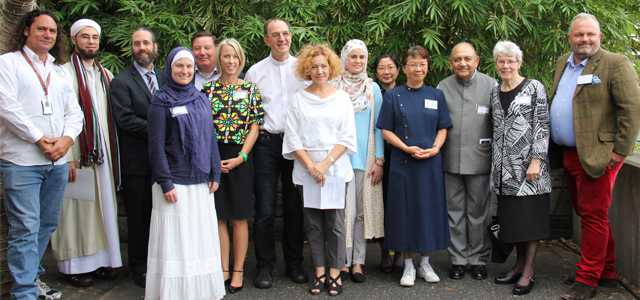Photo courtesy Naomi Shaw: Religious leaders gathered for the FoodFaith event on 17 March
Religious leaders broke bread with academics and sustainability groups on 17 March to discuss the latest food sustainability issues and strategies.
The gathering at Sydney’s Bodhi Restaurant launched a world-first Australian initiative FoodFaith, a response to the growing concerns of climate change, hunger, loss of biodiversity, water restrictions and other environmental crises in which food and agriculture play a major role.
FoodFaith brings to the table the specific traditions of the major faiths that nurture our world and encourages interfaith dialogue and actions surrounding food sustainability.
Supporting organisations include the University of Technology Sydney’s Institute for Sustainable Futures (ISF), the Australian Religious Response to Climate Change (ARRCC) and Meat Free Week.
Attendees included Jacqui Remond, Director of Catholic Earthcare Australia, Imam Ahmed Abdo of the Australian Federation of Islamic Councils, Rabbi Zalman Kastel of Together for Humanity, Rabbi Jordan Cohen from Emanuel Synagogue, Sr Elizabeth Delaney, General Secretary of the National Council of Churches Australia, Dr Miriam Pepper of Uniting Earthweb, Vijai Singhal of the Hindu Council of Australia, Clarence Slockee, Education Co-ordinator, Aboriginal Programs at Botanic Gardens & Centennial Parklands Sydney, and Kim Lee from Tzu Chi Buddhist Sydney.
ABC Radio National’s Dr Rachael Kohn, presenter of The Spirit of Things, also spoke at the event.
Key recommendations of the FoodFaith initiative are:
- Limiting food waste
- Eating less meat and more vegetables to reduce our personal carbon footprint
- Sharing excess food with organisations who can benefit
- Linking up with local farmers through community supported agriculture
- Advising against or banning the use of ingredients from endangered plants and animals in food and traditional medicines.
ISF researcher Judith Friedlander says FoodFaith is also a platform for different religious groups to come together and assist those less fortunate by providing a meat-free meal as a communal activity.
“Every faith celebrates food as a spiritual gift and every faith has something powerful to say about our role in protecting the natural world,” she said. “Our choices of what, when and how we eat have a huge impact upon the Earth, our fellow human beings and other living creatures.
“One of the practical initiatives FoodFaith is looking to implement is an interfaith youth project creating an edible green wall and garden together. The ‘Planting Seeds’ project aims to create ‘fertile common ground’ where everyone has a different yet complementary role to encourage growth and nourishment.”
Further information contact Judith Friedlander, Judith.Friedlander@uts.edu.au






